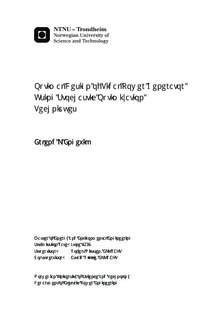| dc.contributor.advisor | Nilssen, Robert | nb_NO |
| dc.contributor.advisor | Røkke, Astrid | nb_NO |
| dc.contributor.author | Engevik, Erlend L | nb_NO |
| dc.date.accessioned | 2014-12-19T13:56:42Z | |
| dc.date.available | 2014-12-19T13:56:42Z | |
| dc.date.created | 2014-11-13 | nb_NO |
| dc.date.issued | 2014 | nb_NO |
| dc.identifier | 762912 | nb_NO |
| dc.identifier | ntnudaim:11263 | nb_NO |
| dc.identifier.uri | http://hdl.handle.net/11250/258085 | |
| dc.description.abstract | Particle Swarm Optimization (PSO) and Genetic Algorithms (GA) are usedto reduce the cost of a permanent magnet synchronous generator with concentratedwindings for tidal power applications. Reducing the cost of the electricalmachine is one way of making tidal energy more competitive compared to traditionalsources of electricity.Hybrid optimization combining PSO or GA with gradient based algorithmsseems to be suited for design of electrical machines. Results from optimizationwith Matlab indicate that hybrid GA performs better than Hybrid PSO forthis kind of optimization problems. Hybrid GA shows better convergence, lessvariance and shorter computation time than hybrid PSO.Hybrid GA managed to converge to an average cost of the generator that is 5.2% lower than what was reached by the hybrid PSO. Optimization results showa variance that is 98.6 % lower for hybrid GA than it is for hybrid PSO. Movingfrom a pure GA optimization to the hybrid version reduced the average cost31.2 %.Parallel processing features are able to reduce the computation time of eachoptimization up to 97 % for large problems. The time it took to compute aGA problem with 2500 individuals was reduced from 12 hours to 21 minutesby switching from a single-processor computer to a computer with 48 processorcores. The run time for PSO with 400 particles and 100 iterations went from18.5 hours to 74 minutes, a 93 % reduction. | nb_NO |
| dc.language | eng | nb_NO |
| dc.publisher | Institutt for elkraftteknikk | nb_NO |
| dc.subject | ntnudaim:11263 | no_NO |
| dc.subject | MTENERG energi og miljø | no_NO |
| dc.subject | Elektrisk energiteknikk | no_NO |
| dc.title | Optimal Design of Tidal Power Generator Using Stochastic Optimization Techniques | nb_NO |
| dc.type | Master thesis | nb_NO |
| dc.source.pagenumber | 29 | nb_NO |
| dc.contributor.department | Norges teknisk-naturvitenskapelige universitet, Fakultet for informasjonsteknologi, matematikk og elektroteknikk, Institutt for elkraftteknikk | nb_NO |

